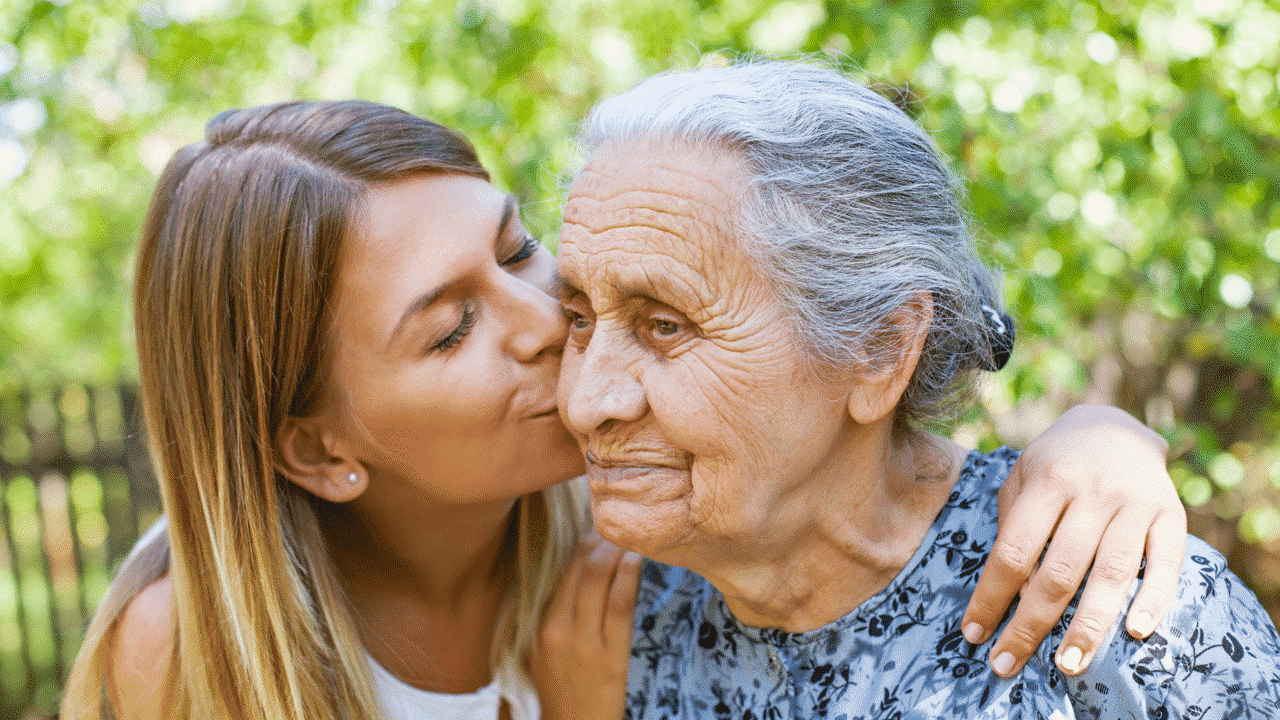November is National Caregiver Month, but I really think this entire year should be dedicated to caregivers for all that they have been through during COVID.
In today’s episode, I share statistics about the toll of caregiving during COVID and 5 self-care strategies for caregivers during COVID.
Family caregivers during COVID are more stressed and overwhelmed than ever before and here are some reasons why:
- Approximately 61% of caregivers are employed while caregiving. Of these caregivers, 60% work 40 or more hours a week and another 15% work 30-39 hours per week.
- Caregiving resources during COVID have been limited. Many resources that caregivers rely on like senior centers and adult day programs have been (and remain closed) for several months.
- Caregivers may not be comfortable with home health aides coming into the home for fear of exposure to COVID, so have cancelled home health aide assistance, and as a result are providing many of the more challenging tasks, like toileting, grooming, bathing, etc.
- With changes in routines and social interaction being limited, the person receiving care is more likely to decline in mental and physical health. And if you’re caring for someone with dementia, there may be more episodes of agitation and other behavioral challenges.
- People who require caregiving are likely to have medical vulnerabilities making them more susceptible to COVID, which comes with a host of anxiety and lots of fear and uncertainty related to exposure to COVID.
All together, this means that caregivers have more caregiving tasks, more stress and worry, fewer community resources needed to care for their loved one, and don’t have the breaks from caregiving that are essential to maintaining health and wellness.
The Toll of Caregiving During COVID
Last week, I met with a stressed out and burned out caregiver. Before the Coronavirus Pandemic, the person receiving care (the husband) would have a home health aide 3 days a week and he would attend an adult day program 5 days a week. These resources would help his wife (the caregiver) to continue to work to support them and have a break from caregiving, so that she wouldn’t have to give up her whole life in exchange for caregiving. Since the Coronavirus Pandemic started, the husband’s adult day program has closed, and the caregiver opted not to have the health aide come due to her concerns about COVID exposure. As a result, the caregiver was experiencing lots of stress and overwhelm trying to figure out how to work and caregive full-time.
This caregiver is not alone. A national survey conducted between May and June 2020, found that 32.9% of caregivers reported mental health problems like anxiety, depression, or substance use compared to 6.3% of non-caregivers.
This same study found that 30.7% of caregivers of older adults thought about suicide between May and June 2020, which is much higher than other high risk groups like essential workers (21.7%), young adults ages 18-24 (25.5%), Hispanics/LatinX folks (18.6%) and African American/Black folks (15.1%).
This is a very painful time, please take care of yourself. If you or someone you know is in crisis or struggling with thoughts about harming yourself or others, please reach out to the National Suicide Prevention Lifeline at 1-800-273-8255
To help caregivers weather the storm of caregiving during COVID, here are:
5 Self-Care Strategies for Caregiving During COVID
1. Identify what gets in your way of taking care of yourself.
As you begin to enhance your self-care, it can help to identify what gets in your way of taking care of yourself. Take some time to acknowledge the most common obstacles to your self-care.
- The most common barrier I hear is:
- “I don’t have time”
- “my loved one needs all my time”
- While this may be true, often when I ask caregivers to look a little deeper, we discover other barriers like:
- “I feel guilty taking time to enjoy myself when my loved one cannot”
- “Other people might think that I’m shirking my responsibilities or being selfish if I make time for myself”
After you identify your own unique barriers to self-care, think of how these barriers or beliefs originated, for example:
- Were you raised to put others before yourself?
- Were you raised to hold a certain level of “duty” to your family?
2. Shift how you think about self-care
Not only is taking better care of yourself important, so too, is how you think about taking the time for yourself. Shift from the old way of thinking to a new way of thinking. For example:
- Instead of saying: “I can’t take a walk, my mom needs me. And if I’m honest, I feel guilty getting outside on this beautiful day when my mom is stuck inside.”
- Try saying: “Taking a walk for myself now will give me some time to be alone and decompress, which will lower my stress. My mom will sense that my mood has changed and benefit from my taking care of myself.“
3. Set goals for taking better care of yourself
Here are categories that caregivers tend to have difficulty prioritizing their own self-care in. Take some time to rate how well you are taking care of yourself in each of these categories. Use the scale 0 = poorly to 5 = outstanding to rate how well you are taking care of yourself
- Sleep. Are you getting enough sleep? Rate yourself between 0 to 5.
- Eating habits. Are you getting adequate nutrition? Rate yourself between 0 to 5.
- Exercise/Fitness. Are you getting enough exercise? Rate yourself between 0 to 5.
- Self-care when sick. Do you take care of yourself when you’re sick? Rate yourself between 0 to 5.
- Your own medical and mental health appointments. Do you put off your mental health or medical appointments or prioritize them? Rate yourself between 0 to 5.
- Substance Use. Are you drinking more than you used to? Rate yourself between 0 to 5.
Now, select the category that stands out to you most and identify one way that you could start to take better care of yourself in this area. For example:
- I’ve been drinking a bottle of wine a night, I am going to cut down to 2 glasses max.
- I’ve been going to bed too late, I’m going to get in bed an hour earlier.
4. Set yourself up for success.
Imagine what moving toward your self-care goal looks like, identify any problems, then troubleshoot the steps to eliminating or moving past the problems. For example:
- Goal: Drink one glass of wine per night (instead of one bottle)
- Potential Problem: When you see a bottle of wine sitting on the counter, you’re tempted to keep pouring ’til the bottle is empty
- Solution: pour a glass of wine, put the cork back on, and put the bottle all the way in the back of the fridge and place other objects in front of it. The more distance and obstacles you put in front of the bottle of wine, the less likely you are to go through the trouble of getting it out again.
- Goal: Go to bed an hour earlier at night.
- Potential Problem: You get busy watching a TV show or doing a hobby and forget about the time.
- Solution: Set an alarm on your phone for 30min before your desired bedtime to remind you to start getting ready for bed
- Potential Problem: You get busy watching a TV show or doing a hobby and forget about the time.
5. Ask your friends, family, neighbors, church family/friends, and health aides for help
With many of the formal caregiving supports unavailable, it’s essential to build an informal care team. Asking for help is really hard for caregivers to do, but remind yourself that you’re worth it.
It can help to be clear about what you need help with. For example: If you’d like a break every Friday from 12-3pm, ask 3 friends if they’d be willing to spend time with your loved one from 12-3pm on a Friday, maybe one of your friends will say yes, and PRESTO, you’ll be scheduled for a break.
Remember: Your health is just as important as everyone else’s.
Special note to friends and families of caregivers.
If you’re a family member or friend of someone who’s caregiving, think of ways to be helpful. Can you drop off a meal? Run an errand? Meet up for a chat outside on the patio?
Just last week, a dear friend of mine had to move her mom into a memory care unit after being in the hospital for a few weeks as a result of agitation and delusions with dementia. If you’ve gone through this, you know how incredibly stressful this is. Because of COVID, my friend only had a small window of time to move her mom’s furniture out of Assisted Living. When my friend reached out to me to see if her daughter could hang out with me and my kids for the day, “of course” was the first thought in my mind. And, you know what? We had a blast!!!
BONUS TIP: Get mental health & caregiving support when you need it
Where to find caregiving information, education and support.
- CaregiverAction.org has a free caregiver hotline and lots of resources related to caregiving during COVID-19. Call 855-227-3640, or chat here
- The Family Caregiver Alliance offers resources, support programs for caregivers, and a hotline during business hours (Pacific Standard Time) at 800-445-8106. Learn more about them, here.
- Alzheimer’s Association. If you’re caring for someone with dementia, the Alzheimer’s Association has a 24/7 helpline at 800.272.3900. Learn more here!
Insider Tip: your loved one doesn’t have to have Alzheimer’s Disease, they can have any type of dementia for you to receive support there!
- Rosalynn Carter Institute for Caregiving offers many caregiver support programs. Check them out, here.
In wrapping up, I hope you hear the message loud and clear that you are not alone. There are lots of free resources and hotlines available to support you!
References:






